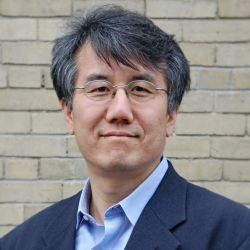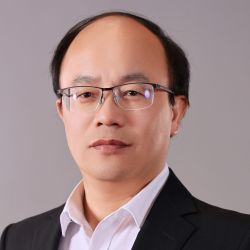
Plenary Speakers

ICA MANAS-ZLOCZOWER
Towards a Circular Economy: Recycling Thermoset Waste Via Dynamic Chemistry
Ica Manas-Zloczower is the Thomas W. and Nancy P. Seitz Professor of Advanced Materials and Energy in the Department of Macromolecular Science and Engineering and the Distinguished University Professor at Case Western Reserve University. She received BS and MS degrees in Chemical Engineering from Polytechnic Institute Jassy, Romania and a Doctor of Science in Chemical Engineering from the Technion-Israel Institute of Technology. She was a post-doctoral fellow at the University of Minnesota. She was elected and served as the President of the International Polymer Processing. She is also a fellow of the Society of Plastics Engineers and was elected to the Board of Directors of Extrusion Division of the Society of Plastics Engineers. She was the Editor-in-Chief of the Journal of Polymer Engineering and serves on the Book Advisory Board for Hanser publisher.
Professor Manas-Zloczower’s research accomplishments have been recognized through more than 90 plenary, several keynotes, lectures at national and international conferences. She has advised 35 Ph.D. students, 30 M.S. students, 18 post-docs, 4 Ph.D. exchange students and many undergraduate students. Professor Manas-Zloczower has more than 220 publications in peer-reviewed journals, more than 100 published conference proceedings, and several book chapters and patents. She is the editor of the 2009 book “Mixing and Compounding of Polymers” published by Hanser.
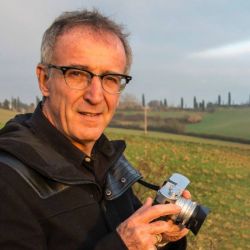
TIM A. OSSWALD
Environmentally Safe Preservation, Stabilization and Processing of Natural Rubber Latex in an Acid Environment
Tim Osswald is a Professor of Mechanical Engineering and Director of the Polymer Engineering Center at the University of Wisconsin-Madison. Originally from Cúcuta, Colombia, he received his B.S. and M.S. in Mechanical Engineering from the South Dakota School of Mines and Technology and his Ph.D. in Mechanical Engineering at the University of Illinois at Urbana-Champaign in the field of Polymer Processing. He spent two and one half years at the Institute for Plastics Processing (IKV) in Aachen, Germany, as an Alexander von Humboldt Fellow. In 2006 he was named an Honorary Professor at the University of Erlangen-Nuremberg in Germany and in 2011 he was named Honorary Professor at the National University of Colombia. Professor Osswald has published over 300 papers and over a dozen books. His books have been translated into Italian, German, Spanish, Japanese, Chinese, Korean, Russian and Farsi. Professor Osswald serves on the Scientific Advisory Board of several industries and is part of a Commission to create a Science Ministry in Colombia.
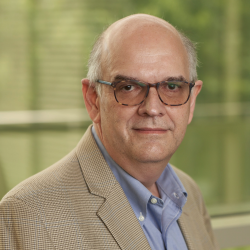
Alejandro J. Müller
Tailoring the Structure and Properties of Isodimorphic Random Copolymers by Varying Chemical Structure and Composition
Professor Alejandro J. Müller is a Materials Engineer, with an M.Sc. in Chemistry (IVIC, Caracas, Venezuela) and a Ph.D. in Physics (from Bristol University, U.K.). He held a full professorship at Simón Bolívar University in Caracas, Venezuela. Since September 2013, he is an IKERBASQUE Research Professor at POLYMAT and at the Department of Polymers and Advanced Materials: Physics, Chemistry and Technology, Faculty of Chemistry, University of the Basque Country UPV/EHU in Donostia-San Sebastián, Spain. He has co-authored more than 600 publications and achieved an h index of 72. He has supervised 28 Ph.D. theses and over 60 M.Sc. theses. Prof. Müller has given around 100 keynotes, plenaries, and invited lectures in more than 30 countries around the world. His fields of interest include: morphology, nucleation, crystallization, and crystallization kinetics of semi-crystalline polymers and multiphasic materials (in particular, polymer blends, block copolymers, biopolymers, and nano-composites). Prof. Müller has won several awards in Venezuela, including the Lorenzo Mendoza Fleury, Polar Prize for basic science. In 2011 he received the international «Paul J. Flory Polymer Research Prize». He is a Corresponding Member of the National Academy of Engineering and Habitat from Venezuela (ANIH). In 2021 he was elected as a corresponding member of the LatinAmerican Academy of Sciences (ACAL). He is an editor for POLYMER (Elsevier) in the joint areas of Polymer Physics and Physical Chemistry.
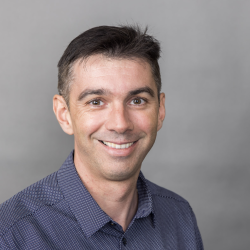
Cyrille Boyer
Nanostructure Control in 3D Printing through Polymerization Self-Assembly Process
Prof Cyrille Boyer is an Australian Laureate Fellow, a full Professor in the School of Chemical Engineering, deputy-Head of School, and co-Director of Australian Centre for Nanomedicine at the University of New South Wales. Before joining UNSW, he has worked with Solvay-Solexis and Dupont Performance Elastomers. He is an associate Editor of European Polymer Journal and a member of Advisory Board of Advanced Materials, ACS MacroLetters, Polymer Chemistry, Journal of Polymer Science, etc.
His research has been recognized by several fellowships, including Australian Research Council (ARC) Australian Postdoctoral Fellowship (ARC-APD, in 2009) and ARC Future Fellowship (in 2013), and more recently, ARC Australian Laureate Fellowship (starting in 2023). He has received several prestigious research awards, including 2018 IUPAC-Polymer International Young Researcher award, 2016 ACS Biomacromolecules/Macromolecules Young Researcher Award, 2016 Journal of Polymer Science Innovation award, Le Fevre Memorial Prize awarded by Australian Academy of Science for chemistry, and 2015 Malcolm McIntosh Prize for Physical Science (one of the Prime Minister Prizes for Science). Since 2018, he has been listed as a Highly Cited Researcher in Chemistry and Cross-field by Clarivate and named as one of the Leaders in Polymers and Plastics by the Australian Newspaper. He has co-authored over 375 research articles, resulting in over 30,000 citations and H-index of 97 (Google Scholar).
Cyrille’s research interests mainly cover the preparation of functional macromolecules using photocatalysts, which find applications in various areas, including nanomedicine, advanced materials, and energy storage. In nanomedicine, his group designs new antimicrobial polymers. More recently, he has implemented his photochemistry to 3D printing for the fabrication of 3D printed objects with a control over the nano- and macro-structure.
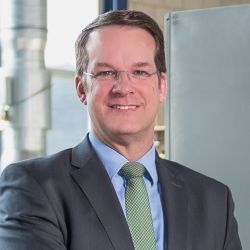
Christian Hopmann
Dr. Christian Hopmann holds the Chair for Plastics Processing and is director of the IKV – Institute for Plastics Processing in Industry and Crafts at RWTH Aachen University in Germany. He is as well co-founder of the AZL – Aachen Center for Lightweight Production and Vice Dean of the faculty for Mechanical Engineering of RWTH Aachen University. His interest is fundamental and applied research in plastics technology with particular focus on Digitization and Simulation, Lightweight Technologies and Circular Economy. Hopmann is principal investigator and member of the steering committee of the German Federal Cluster of Excellence “Internet of Production”. He initiated the Polymer Innovation Center 4.0, which addresses the domain specific realization and implementation of digitization techniques including AI in the plastics industry with particular focus on SME.
After studying mechanical engineering, he received his doctoral degree from RWTH Aachen University in 2000. Following a senior vice-director position at IKV, he started his industrial career in 2005 at the plastics processing company RKW SE, mainly in production of compounds and films, latterly as Managing Director of RKW Sweden A.B. in Helsingborg/Sweden. He participated in the Program for Executive Development at the International Institute for Management Development (IMD) in Lausanne, Switzerland. Hopmann received the Innovation Award of Germany’s federal state North Rhine-Westphalia in 2014. He has been appointed visiting professor at the Beijing University of Chemical Technology, Beijing/China in 2017 and fellow of the Society of Plastics Engineers, CT/USA, in 2019. Hopmann serves as international representative of the Polymer Processing Society since 2021 and is member of the board of directors and the scientific advisory board as well as chairman of the board of the material engineering division of the VDI – The Association of German Engineers since 2022. In 2023 he was awarded the Richard Vieweg Medal for extraordinary services to the plastics technology and in 2024 the Heinz List Award for outstanding achievements in polymer devolatilization and reactive processing, sponsored by the Extrusion Division of the Society of Plastics Engineers (SPE).
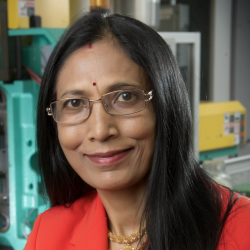
Manjusri Misra
Dr. Manjusri Misra is a professor and Tier 1 Canada Research Chair (CRC) in Sustainable Biocomposites in the School of Engineering and holds a joint appointment in the Department of Plant Agriculture at the University of Guelph. As well, she is the Research Program Director of the Bioeconomy Panel for the Ontario Agri-Food Innovation Alliance, a program between the Ontario Ministry of Agriculture and Rural Affairs (OMAFRA) and the University of Guelph. She is a Fellow of the Royal Society of Chemistry (UK), the American Institute of Chemical Engineers (AIChE), and the Society of Plastic Engineers (SPE).
Misra’s current research focuses primarily on novel biobased composites and nanocomposites that can take the place of conventional plastics in many commercial applications, from packaging to auto parts. She specializes in the development of advanced polymeric materials from sustainable resources, recycled materials, and waste-streams to reduce landfilling, ocean pollution, and greenhouse gas emissions, supporting Circular Economy. She has authored more than 800 publications, including 450 peer-reviewed journal papers, 30 book chapters, and 55 patents. Her Google-Scholar citations count is 47,135 and h-index 96 (June 15, 2023).
She was the editor or co-editor of 5 books in the area of biocomposites and nano materials. She was an editor of the CRC Press volume, “Natural Fibers, Biopolymers and Biocomposites,” Taylor & Francis Group, Boca Raton, FL (2005); American Scientific Publishers volume “Packaging Nanotechnology”, Valencia, California (2009); “Polymer Nanocomposites”, Springer (2014) and “Fiber Technology for Fiber-Reinforced Composites”, Woodhead Publishing (2017). She was the chief editor of “Biocomposites: Design and Mechanical Performance” Woodhead Publishing (2015). She was the President of the BioEnvironmental Polymer Society (BEPS) in 2009. She serves on the editorial boards of “Journal of Applied Polymer Science”, “Composites Part A: Science and Manufacturing”, “Polymer Testing”, “Macromolecular Materials and Engineering”, «ACS Omega», and “Composites Part C: Open Access”. Dr. Misra has received many awards including the Andrew Chase Forest Products Division Award from the AIChE and the Lifetime Achievement Award from the BioEnvironmental Polymer Society (BEPS). In 2020, she was selected as one of Canada’s Most Powerful Women: Top 100 Award Winner in the Manulife Science and Technology category from the Women Executive Network
JAMES L. WHITE INNOVATION AWARD
Chul B. Caleb Park
Professor Park holds the post of Distinguished Professor of Microcellular Engineered Plastics at University of Toronto. Professor Park is the Director of the Microcellular Plastics Manufacturing Laboratory, which is highly regarded as one of the world’s pioneering research institutions in the refining of plastics foaming technology. Professor Park is an accomplished scientist with an outstanding track record in the field of polymer foam processing, for which he has garnered international recognition. His research has had a major impact in his research field, and he is one of the most cited researchers in polymer processing and foaming. He is the author or co-author of over 2500 professional publications, including four books, 550 journal papers, and 500 conference papers. His publications have earned him a Scopus H-Index of 94 and Scopus Citations of 32,000.
Because his inventions are internationally recognized, Professor Park has attracted numerous industrial companies to work with his research group at University of Toronto through contracts or Consortium. More than 50% of his research funds (~US$45M) came from industry. Most of his research funds have been used to hire and train research staff (i.e., postdocs and students). More than 300 people have been engaged and trained in his lab: 75 (72 completed + 3 current) postdocs, 110 (83 completed + 27 current) PhD students, and 138 (completed) Master students. 44 amongst these trainees became professors. He models the importance of working in collaborative teams with industrial companies while focusing on industrially relevant, innovative technology development based on the fundamental scientific findings. His approach has been very successful, and he became a trend setter for plastic foaming research.
In recognition of his distinguished research achievements, he received over 100 awards and honours in his career. He has been inducted into 6 national academies: the Academy of Sciences of the Royal
Society of Canada, the Canadian Academy of Engineering, the Korean Academy of Science and Technology, the National Academy of Engineering of Korea, the European Academy of Science, and the Chinese Academy of Engineering. He is also recognized as a Fellow of 6 professional organizations.
MORAND LAMBLA AWARD
Junwei Gu
Junwei Gu, Professor, Ph.D. supervisor, Chinese National-Level Leading Talent, Leader of the Shaanxi Provincial Science and Technology Innovation Team for «Thermally Conductive Polymer Composites», Dean of the School of Chemistry and Chemical Engineering in Northwestern Polytechnical University. He has been elected as a Fellow of the Royal Society of Chemistry, a Fellow of the Royal Aeronautical Society, and a Fellow of the Institute of Materials, Minerals & Mining. Additionally, he has been recognized as a Highly Cited Researcher by Clarivate and a Most Cited Chinese Researcher by Elsevier. He currently serves as the Deputy Secretary-General, Director, Deputy Chair of the Youth Working Committee, and Executive Deputy Director of the Thermal Conductive Composite Materials Professional Committee of the Chinese Society for Composite Materials. He is also the Vice Director of the Shaanxi Key Laboratory of Macromolecular Science and Technology. His research primarily focuses on the design, preparation, and processing of functional polymer composites and fiber-reinforced advanced resin-based composites. He has received four provincial and ministerial-level scientific research awards, including the Second Prize of the Shaanxi Provincial Natural Science Award and the Second Prize of the Ministry of Education’s Technological Invention Award. He has also been honored with prestigious awards such as the Morand Lambla Award from the Polymer Processing Society, the Young Scientist Award from the Chinese Society for Composite Materials, and the Innovative Award for Polymer Forming Processing and Industrial Development.
He has published more than 160 academic papers in journals such as Angewandte Chemie International Edition, Advanced Materials, and Macromolecules, as the first and/or corresponding authors. He is the author or co-author of 4 monographs, holds 34 granted invention patents, and serves as associate editors or editorial board members for journals including Composites Science and Technology, Nano-Micro Letters, and National Science Review.
